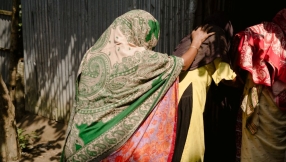
The wives of Islamic State fighters ponder what to wear at a beheading and assess how sexy they look in suicide vests.
It's a BBC satire that has sparked both anger and praise for tackling the fate of women who travel to Syria to join the militants.
In a clip from the BBC's Revolting TV comedy show, entitled 'Real Housewives of ISIS' which aired on Tuesday, one wife of a militant fighter in Syria says: "It's only three days to the beheading and I've got no idea what to wear."
"This is my sixth marriage – I have been widowed five times," another woman says with a sigh before an explosion which prompts her to say: "Six times."
It's a parody of the successful reality TV franchise which began in 2006 with The Real Housewives of Orange County and now has spin-off versions worldwide including one set in Cheshire, England. This one features women with Birmingham and Manchester accents squabbling because they're wearing the same suicide vests ("It was so cringe, hashtag matchy matchy...").
In one scene, a woman parades a chain that ties her to a cooker: "Ali's brought me a new chain which is eight foot long so I can almost get outside, which is great."
I thought it was hilarious, but plenty of people didn't. "The BBC really made a satirical show called 'The Real Housewives of ISIS' while the real housewives of ISIS are being raped and abused daily", said one Twitter user. Another said: "real housewives of isis is stupid, disrespecting and just ew".
Others were more complimentary.
The social media storm has certainly done its job in generating YouTube views – more than a million and a half, and counting. But is it really justified?
The truth is that we've always made fun of things that frighten us. It's a way of dealing with the fear. Looking at something evil and laughing at it is an expression of courage, not insensitivity.
The British, particularly, have form in this area. One of our best-loved comedies is Dad's Army, which satirises the (supposed) bumbling incompetence of the Home Guard in World War II. It's not always remembered that there were strong objections to it at the time because it seemed to trivialise what they did. The same objections were made to another wartime spoof, Allo, Allo, which cheerfully mocked the French Resistance and the Gestapo – surely no laughing matter. And what about the Chris Morris film Four Lions (2010), the comedy about inept Islamist terrorists trying to attack the London Marathon?
Having said that, it has to be admitted that distance – in time or space – does make a difference, and that it's impossible to imagine some situations generating comedy at all. They are monoliths of evil, and they can only be mourned and condemned. ISIS, however, is not like that. Yes, it numbers dead-eyed, dead-hearted murderers and rapists among its number. It has done terrible things and will do more before it's finished. Asking for laughter from those who have suffered directly at its hands is asking too much. Those of us who haven't grieve with them. But some of those who've gone to join them begin, at least, as half-baked juvenile ideologues with the intellectual capacity of a gerbil. We need to be free to see the humour in that.
Perhaps most importantly of all – and most threateningly of all – comedy like this humanises them. By teaching us to laugh at them it helps stop us demonising them. And this really matters, because the person wearing the suicide vest, holding the execution knife or plotting the next car bomb, is a human being and a child of God, no less than their victims. Look at what these people have done, and yes, that is challenging to the point of being offensive. But it is Christianity: people don't stop being loved by God just because they do terrible things. Laughter reminds us of that.
Follow Mark Woods on Twitter: @RevMarkWoods













